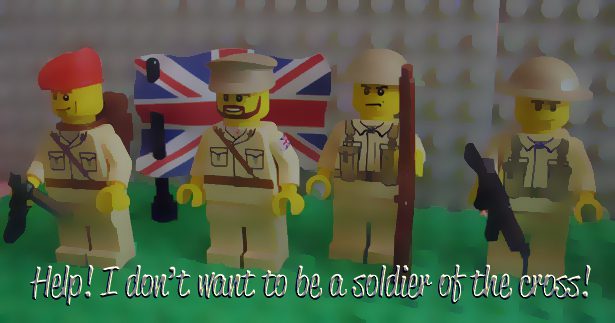Did Jesus finish the work of defeating evil or did he not finish the work and therefore we must go to battles and wars for him?

Dear Thoughtful Pastor: There is a hymn called “Stand Up, Stand Up for Jesus.” It speaks of Christians as soldiers of the cross, marching as to war against what would seem to be some tremendous foes.
These soldiers are stridently urged into battle so the royal banner of Jesus will not “suffer loss.”
They wear armor and believe that every foe must be vanquished so Christ can be Lord indeed.
This hymn disturbs me. I thought Jesus was Lord from the outset, and not as a result of people doing battle for him, but as a result of his doing battle for them. He defied evil attempts to seduce him into sin and went to hell and back to secure our souls. Surely we as Christians can’t know more about fighting enemies than he does.
I am more of an “Amazing Grace” or a “Morning Has Broken” type of person. Is it alright if I don’t want to be a soldier?
The short answer is “Yes, of course, it is all right.”
The longer answer needs to take into consideration the reasons behind the war-like language and actions that have long permeated Christian thinking.
If we work off only the teachings of Jesus as recorded in the four Gospels, warlike desires and actions for Jesus-followers face a big disconnect between the text demanding we love our enemies and actions that kill our enemies.
However, there is much more to the Bible than the kingdom of heaven world taught and modeled by Jesus. Let us also be clear: Jesus’ teaching and modeling the idea of loving enemies did not stop those very enemies from torturing and killing him.
Violence and wars are all over the Bible
Violent texts bookend the Gospels. Early writings like Judges, Kings and Chronicles and later books, particularly the apocalyptic book of The Revelation of John, swim in bloodshed, destruction, murder, and mayhem.
In these, we read of an angry, vengeful God. Such depictions do, for many, justify anger, wars and vengeance, all for the sake of defending that God.
The question in a nutshell: Did Jesus finish the work of defeating evil or did he not finish the work and therefore we must go to battles and wars for him?
Here’s my take: Jesus did finish it. His work was done. We need not defend Jesus’ honor. Not our responsibility, not our problem.
However . . . and there always is a “however,” evil thoughts and actions still surround us.
Definition of evil
My definition of evil: the lust for power over others, the willingness to treat the entire world as an object created to meet our self-centered needs, and the wanton disregard of future effects for present actions.
Evil, understood this way, consistently and without qualms seeks advantage over the weak and undefended. Anything weak and undefended has, in the utter selfishness of an evil-based system, no intrinsic value other than being used to satisfy our desires.
Now Jesus-followers have an obligation to stand up to oppression and evil in whatever forms it takes. That may mean going into battle.
The human capacity for self-deception
But it is a very fine line that separates fighting against the evil that oppresses others and fighting for our power and increasing greatness.
We humans easily convince ourselves that we operate only from the best of motives. Others, especially those we define as the enemy, operate only from the worst of motives. With this sub-conscious self-deception often informing our decisions, our “best motives” quickly morph into the very evil we insist we fight against.
Again, I think you are right. Jesus has done the eternal work and won that battle. Keep in mind that, though, that Jesus’ teachings about the kingdom of heaven stand against the norms of observed nature, against the cruelty of the survival of the fittest society. He taught with solid knowledge that the people of God long to live outside those violent, “kill to live” norms.
The real shalom
The prophet Isaiah wrote these hopes of peace among us:
The wolf shall live with the lamb, the leopard shall lie down with the kid, the calf and the lion and the fatling together, and a little child shall lead them. The cow and the bear shall graze, their young shall lie down together, and the lion shall eat straw like the ox. The nursing child shall play over the hole of the asp, and the weaned child has put his hand on the adder’s den. (Isaiah 11:6-8, NRSV).
Can you see it? These words describe the real peace, the shalom, the maturity, the final perfection, of all creation. No longer do the strong and powerful destroy the weaker and more vulnerable.
But human societies have not come close to that ideal. And until that happens, we need to stand up and fight evil and oppression, not hurt others to defend Jesus. This distinction continues to matter.
As for you, just don’t sing those hymns. Sometimes, they are full of bad theology.
 [Note: A version of this column is slated to run in the April 21, 2017, edition of the Denton Record-Chronicle. The Thoughtful Pastor, AKA Christy Thomas, welcomes all questions for the column. Although the questioner will not be identified, I do need a name and verifiable contact information in case the newspaper editor has need of it. You may use this link to email questions.]
[Note: A version of this column is slated to run in the April 21, 2017, edition of the Denton Record-Chronicle. The Thoughtful Pastor, AKA Christy Thomas, welcomes all questions for the column. Although the questioner will not be identified, I do need a name and verifiable contact information in case the newspaper editor has need of it. You may use this link to email questions.]













